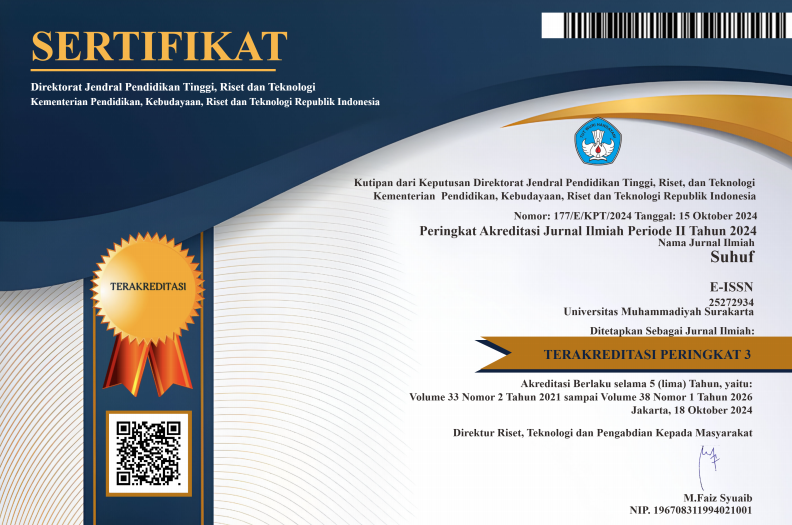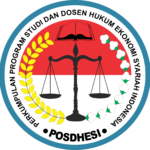Zakat Distribution Management: A Systematic Literature Review
DOI:
https://doi.org/10.23917/suhuf.v36i1.4357Keywords:
Zakat distribution management, Collaboration, Digitalization, Productivity, Islamic social fundsAbstract
The social function of zakat as a maliyah ijtimaliyah worship will be optimized if there is minimal risk during the distribution process (disbursement risk). This can be achieved when stakeholders directly involved in the distribution process employ effective strategies and possess knowledge of zakat distribution management. This study delves into the literature discussing issues related to zakat distribution management over the past decade. Utilizing a qualitative approach with a systematic literature review, data were sourced from articles indexed by Scopus and Google Scholar. The data collection was facilitated using the Publish or Perish (PoP) software. Selected articles underwent analysis using the VOS Viewer tool to discern trends in the literature concerning zakat distribution management. The findings emphasize the importance of policymakers collaborating with specific entities to oversee zakat funds effectively. Furthermore, enhancing administrative and managerial competencies is crucial. Implementation of wakalah and mudharabah methods is recommended, along with leveraging technology's role in the contemporary digital landscape. The study underscores the significance of proactive measures to mitigate risks and optimize the social impact of zakat distribution. By fostering collaboration, enhancing competencies, and embracing innovative methods, stakeholders can ensure the efficient and equitable distribution of zakat funds. These efforts are essential for fulfilling the socio-religious obligations associated with zakat and maximizing its potential to alleviate poverty and promote social welfare.
Downloads
References
M. Arif Mufraini, Akuntansi dan Manajemen Zakat: Mengomunikasikan Kesadaran dan Membangun Jaringan. Jakarta: Kencana Prenada Media Group, 2006.
H. Ahmed, Role of Zakah and Awqaf in Poverty Alleviation. Jeddah: Islamic Development Bank, Islamic Research and Training Institute Jeddah, 2004.
Puskas BAZNAS, Outlook Zakat Indonesia 2023. Jakarta: Puskas BAZNAS, 2023.
S. Aisyah and N. Ismail, “The Distribution of Zakat at the Time of Caliph Umar ibn Khattab,” Al-Iktisab J. Islam. Econ. Law, vol. 3, no. 2, pp. 71–78, 2019, doi: https://doi.org/10.21111/al-iktisab.v3i2.3908.
D. Dyarini and S. Jamilah, “Risk Management of Zakat Management,” in 1st International Conference on Islamic Economics, Business and Philanthropy, 2017, pp. 563–568. [Online]. Available: https://www.academia.edu/85792232/Risk_Management_of_Zakat_Management?uc-sb-sw=49523067
S. Wahyuni, Ekonomi Zakat dan Waqaf. Gresik: CV. Jendela Sastra Indonesia Press, 2021.
M. S. P. Hasibuan, Manajemen: Dasar, Pengertian, dean Masalah, Ed. rev.,. Jakarta: Bumi Aksara, 2007.
S. I. Zadjuli and A. Shofawati, “Implementing Good Corporate Governance in Zakat Institution,” Bussecon Rev. Soc. Sci., vol. 2, no. 1, pp. 27–37, 2020, doi: https://doi.org/10.36096/brss.v2i1.158.
H. Snyder, “Literature Review as a Research Methodology: An Overview and Guidelines,” J. Bus. Res., vol. 104, no. November, pp. 333–339, 2019, doi: https://doi.org/10.1016/j.jbusres.2019.07.039.
M. S. Apriantoro and A. E. Nuraini, “Social Network Analysis of the Development of the Halal Industry in Indonesia,” Bull. Soc. Informatics Theory Appl., vol. 6, no. 2, pp. 102–110, 2022, doi: https://doi.org/10.31763/businta.v6i2.553.
N. M. Nomran and R. Haron, “A Systematic Literature Review on Sharī’ah Governance Mechanism and Firm Performance in Islamic Banking,” Islam. Econ. Stud., vol. 27, no. 2, pp. 91–123, 2020, [Online]. Available: https://www.emerald.com/insight/content/doi/10.1108/IES-06-2019-0013/full/html
M. Ridwan, N. Asnawi, and S. Sutikno, “Zakat Collection and Distribution System and its Impact on The Economy of Indonesia,” Uncertain Supply Chain Manag., vol. 7, no. 4, pp. 589–598, 2019, doi: http://dx.doi.org/10.5267/j.uscm.2019.6.001.
N. Afni, “Manajemen Dan Pendistribusian Zakat Dalam Upaya Peningkatan Kesejahteraan Sosial Masyarakat,” Moderasi J. Stud. Ilmu Pengetah. Sos., vol. 1, no. 2, pp. 34–50, 2020, doi: https://doi.org/10.24239/moderasi.Vol1.Iss2.30.
M. Syahbandir, W. Alqarni, M. A. Z. Dahlawi, A. Hakim, and B. Muhiddin, “State Authority for Management of Zakat, Infaq, and Sadaqah as Locally-Generated Revenue: A Case Study at Baitul Mal in Aceh,” AL-IHKAM J. Huk. Pranata Sos., vol. 17, no. 2, pp. 554–577, 2022, doi: https://doi.org/10.19105/al-lhkam.v17i2.7229.
H. Wahid, S. H. Osmera, and M. A. M. Noor, “Sustainable Zakat Distribution Through Wakalah Contract,” Int. J. Zakat, vol. 6, no. 1, pp. 49–70, 2021, doi: https://doi.org/10.37706/ijaz.v6i1.250.
A. Roziq, Yulinartati, and N. C. Yuliarti, “Model of Productive Islamic Social Fund Management for Poor Empowerment,” Int. J. Prof. Bus. Rev. Int. J. Prof. Bus. Rev., vol. 7, no. 5, pp. 1–16, 2022, doi: https://doi.org/10.26668/businessreview/2022.v7i5.e597.
I. Mardiansah, S. Pawenang, and I. Istiqomah, “Analisis Implementasi Good Amil Governance Berdasarkan Zakat Core Principles Pada Lembaga Amil Zakat (Studi Kasus di Lembaga Amil Zakat Muhammadiyah Solo),” Suhuf, vol. 33, no. 1, pp. 11–25, 2021, doi: https://doi.org/10.23917/suhuf.v33i1.15013.
W. Zuhaili, Fiqhul islam wa adillatuhu. Jakarta: Gema Insani, 2010.
I. S. Beik and Q. Ayuniyyah, “Fiqh of Asnaf in the Distribution of Zakat: Case Study of the National Board of Zakat of Indonesia (BAZNAS),” Al-Infaq J. Ekon. Islam, vol. 6, no. 2, pp. 201–216, 2018, doi: https://doi.org/10.32507/ajei.v6i2.309.
Z. S. Aminuddin, D. M. M. Walid, S. Abd Warif, H. Wathan, and M. F. AK, “Enhancement of Zakat Institutions Through Zakat Management of Gharimin Asnaf: Case Study in Malaysia and Indonesia,” Int. J. Tech. Vocat. Eng. Technol., vol. 2, no. 1, pp. 93–103, 2020, [Online]. Available: https://journal.pktm.com.my/index.php/ijtvet/article/view/31
R. Fahlefi, A. Hasan, and A. Alimin, “Management Model of Zakat Collection and its Distribution for Zakat Agency/Management Model of Zakat Collection and its Distribution for Zakat Agency,” Uluslararası Ekon. İşletme ve Polit. Derg., vol. 3, no. 2, pp. 171–182, 2019, doi: https://doi.org/10.29216/ueip.561657.
M. Lubis, “Zakat Knowledge Unified Management (KUM) System: Connecting the Organisation Diversity in Indonesia,” Int. J. Innov. Creat. Chang., vol. 15, no. 6, pp. 1196–1217, 2021, [Online]. Available: https://www.ijicc.net/index.php/ijicc-editions/2021/221-vol-15-iss-6
Syamsuri, S. Yaumi, J. Fuadah, and Nadhilah, “Unveiling the Bright Prospects for Forecasting the Financial Strength of the National Board of Zakat (BAZNAS) in Indonesia,” in Conference on SDGs Transformation through the Creative Economy: Encouraging Innovation and Sustainability (TCEEIS 2023), Atlantis Press, 2024, pp. 80–84. doi: https://doi.org/10.2991/978-94-6463-346-7_16.
I. H. J. Ahmad and M. Ma’in, “The Efficiency of Zakat Collection and Distribution: Evidence from Two Stage Analysis,” J. Econ. Coop. Dev., vol. 35, no. 3, pp. 133–169, 2014, [Online]. Available: https://www.proquest.com/openview/8dbf74371476452e7b730bce397af6e4/1?pq-origsite=gscholar&cbl=1096395
M. Mutamimah, S. Alifah, G. Gunawan, and M. D. Adnjani, “ICT-based Collaborative Framework for Improving the Performance of Zakat Management Organisations in Indonesia,” J. Islam. Account. Bus. Res., vol. 12, no. 6, pp. 887–903, 2021, doi: https://doi.org/10.1108/JIABR-05-2020-0154.
M. A. Rachman and A. N. Salam, “The Reinforcement of Zakat Management Through Financial Technology Systems,” Int. J. Zakat, vol. 3, no. 1, pp. 57–69, 2018, doi: https://doi.org/10.37706/ijaz.v3i1.68.
M. I. Rosele, A. Muneem, N. N. B. A. Rahman, and A. K. Ali, “The digitalized zakat management system in Malaysia and the way forward,” AL-IHKAM J. Huk. Pranata Sos., vol. 17, no. 1, pp. 242–272, 2022, doi: https://doi.org/10.19105/al-lhkam.v17i1.5365.
A. R. A. Dahlan, S. N. Awang, and A. Mahmood, “e-ZAKAT4U Program: Enhancing Zakat Distribution System by Merging with Network-of-Mosque (Nom),” Int. J. Manag. Commer. Innov., vol. 3, no. 1, pp. 264–268, 2015, [Online]. Available: https://www.researchpublish.com/
N. Omar and K. F. Khairi, “Zakat and Blockchain: A Review,” Int. J. Islam. Econ. Financ. Res., vol. 4, no. 2 Desember, pp. 60–66, 2021, doi: https://doi.org/10.53840/ijiefer53.
M. F. Ibrahim and N. M. B. T. Chek, “The Concept of Al-Falah Maximization: Zakat and Industry Revolution 4.0,” Labu. e-Journal Muamalat Soc., vol. 14, pp. 11–22, 2020, doi: https://doi.org/10.51200/ljms.v14i.2863.
N. A. Mubtadi and D. Susilowati, “Analysis of Governance and Efficiency on Zakat Distribution: Evidence from Indonesia,” Int. J. Zakat, vol. 3, no. 2, pp. 1–15, 2018, doi: https://doi.org/10.37706/ijaz.v3i2.74.

Downloads
Submitted
Accepted
Published
How to Cite
Issue
Section
License
Copyright (c) 2024 Anisa Maisyarah, Muhammad Zilal Hamzah

This work is licensed under a Creative Commons Attribution 4.0 International License.


















